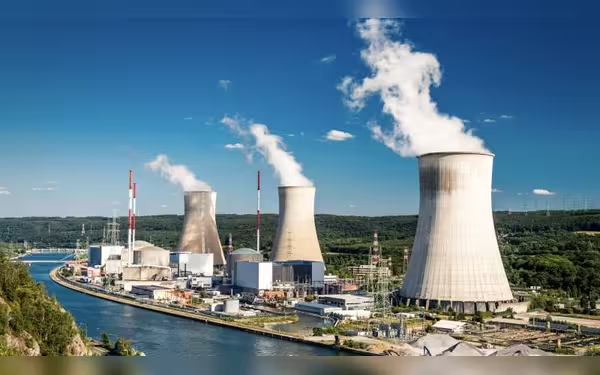Thursday, November 7, 2024 05:33 PM
Nuclear Energy: Pakistan's Sustainable Future
- Nuclear energy offers economic stability and sustainability.
- Pakistan aims for 40,000 Megawatts of nuclear power by 2050.
- Nuclear power ensures reliable baseload electricity generation.
 Image Credits: thefridaytimes
Image Credits: thefridaytimesExplore how nuclear energy can provide Pakistan with a sustainable and economically stable energy future.
In recent years, Pakistan has faced significant challenges in its energy sector, grappling with rising costs and the pressing need for sustainable solutions. As the world shifts towards cleaner energy sources, nuclear power emerges as a viable option for Pakistan. With countries like Saudi Arabia and the UAE investing in nuclear energy, it is crucial for Pakistan to recognize the potential benefits of this energy source. Nuclear energy is not merely an alternative; it is a strategic necessity for ensuring a stable and sustainable energy future.
Pakistan's current energy landscape is heavily reliant on hydrocarbon-based sources, which are not only economically burdensome but also unsustainable in the long run. Over 70% of the country's oil needs are met through imports, making the economy vulnerable to global price fluctuations. For instance, in the fiscal year 2022, energy import bills soared to $23 billion, contributing to an inflation rate of 7.2% in October 2024. In contrast, nuclear energy, despite its high initial costs, offers a more economical solution over time. The International Energy Agency reports that the cost of electricity generated from nuclear power has fallen below that of coal and natural gas, making it a financially sound choice for Pakistan.
To put this into perspective, a nuclear power plant in the United States generates electricity at approximately $0.08 per kilowatt-hour (kWh) over its lifetime, while natural gas and coal can cost around $0.13 and $0.10 per kWh, respectively. Transitioning to nuclear energy in Pakistan could lead to annual foreign exchange savings of about $2.5 billion, providing much-needed price stability for consumers.
Pakistan aims to achieve 40,000 Megawatts of nuclear power generation by 2050, which is equivalent to constructing around 11 Kalabagh Dams. This ambitious goal highlights the immense potential of nuclear energy in addressing the country's energy needs. Unlike the politically divisive Kalabagh Dam project, nuclear power aligns with the United Nations Sustainable Development Goals for 2030, offering a sustainable energy solution that does not strain water resources.
Moreover, nuclear energy provides a consistent baseload power supply, which is essential for meeting the country's energy demands. Unlike renewable sources such as solar and wind, which depend on weather conditions, nuclear power can generate electricity 24/7. This reliability is particularly crucial given the recent fluctuations in water availability that have affected hydropower generation from major dams like Tarbela and Mangla.
Globally, countries like France, which generates 68% of its electricity from nuclear power, demonstrate the reliability of this energy source. France maintains grid stability without the price shocks associated with fossil fuels. For Pakistan, which is striving to reduce carbon emissions, nuclear energy offers a stable complement to renewable sources, enhancing the resilience of the energy grid.
Concerns regarding nuclear safety are valid but often stem from historical incidents that do not reflect the advanced safety measures in modern nuclear plants. Today's reactors are designed with multiple failsafe systems, and the safety record of nuclear energy is among the best in the sector. Pakistan's own nuclear facilities, such as the Chashma Nuclear Power Complex, adhere strictly to international safety protocols, showcasing a commendable track record of over 50 years of safe operations.
As the need for nuclear energy in Pakistan's energy portfolio becomes increasingly urgent, it is time for the nation to prioritize this energy source as a national imperative. The economic, environmental, and social benefits of nuclear energy make it the clear choice for a sustainable future. A strategic focus on nuclear energy will not only stabilize electricity prices but also contribute to environmental preservation.
Countries like the UAE and Saudi Arabia are leading by example, with Saudi Arabia planning to build two large reactors by 2040, despite its vast oil reserves. The UAE's Barakah plant currently supplies 25% of its electricity needs. Even the United States, after years of stagnation in nuclear development, is reviving its reactors to meet energy demands. This global nuclear revival underscores the importance of nuclear energy in today's energy market.
Nuclear power is not just a feasible option for Pakistan; it is a necessary step towards sustainable growth. By embracing nuclear energy, Pakistan can achieve economic independence, long-term cost savings, and a path toward net-zero emissions. It is imperative for the nation to act decisively, channeling public and institutional support towards nuclear energy, thereby reaffirming its commitment to peaceful and sustainable progress.













